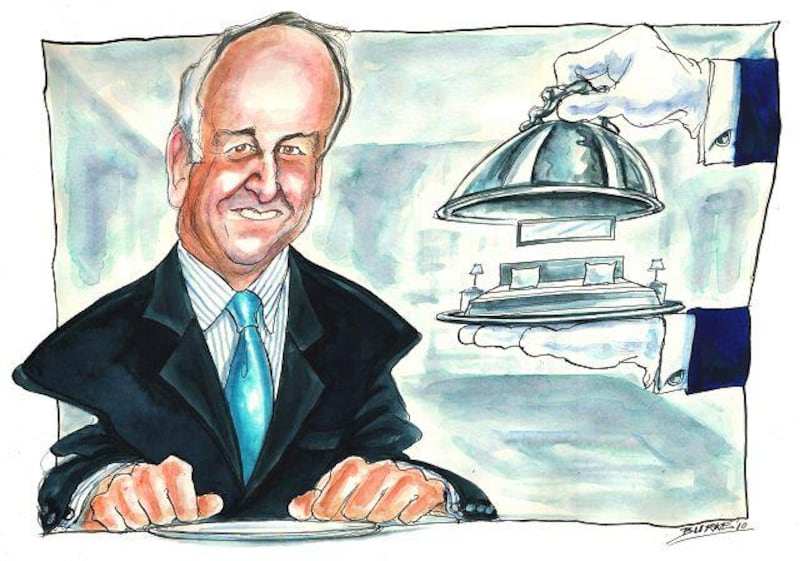Overseas executives coming to the UAE often marvel at the role the majlis plays in business. Is it where the real decisions are made and transactions brokered? Perhaps they should first meet Guy Guillemard, who offers a clear explanation when he says the majlis is akin to a private club.
Mr Guillemard is the co-founder and chief executive of Signature Clubs International (SCI) which owns The Capital Club, a private club at the Dubai International Financial Centre. For him, both the majlis and private clubs are places for influential people to meet in a relaxed manner. Whereas the former is a large, open space, the latter offers discreet rooms and areas offering a degree of anonymity - and also welcomes women, which the old-fashioned clubs of much of the last century did not.
Mr Guillemard was the general manager of the Dubai World Trade Centre from 1979 to 1989. He also served as the director of the Emirates Golf Club and the Dubai Business and Tourism Development board. In 1994 he joined the Hong Kong-based CCA Group and played a key role in its expansion from eight operating clubs to 32 in 16 countries, over four years. He returned to the UAE in 2004 and formed SCI in 2006. Here, he outlines the ethos behind the company's clubs.
q What are the underpinning values of The Capital Club? a We are unashamedly a club for leading and successful people in the business community. Membership is by invitation only and based on a referral system. The club is never advertised. It offers a relaxed setting for business leaders to meet, entertain, attend events and share their opinions. When executives are away from the hurly-burly of their office they are often more relaxed, so when they meet they get talking in a more natural way.
What kind of people does the club appeal to? It can be summed up in one word - "international". The membership cuts across all nationalities, much like the general nature of Dubai. The club is a place where senior people from diverse backgrounds feel comfortable to socialise and meet their peers. Thirty-nine per cent of our members come from the banking, finance and insurance industry, which is not surprising since we are located at the DIFC. The second largest segment is consulting and business services, which makes up 17 per cent of the membership. Fifty-two per cent are CEO's, managing directors or partners, and 22 per cent are at director or department head level, while 20 per cent are chairmen, presidents or founders of their companies. In terms of age, 35 per cent are between 30 and 40 years old ,with 32 per cent being 41 to 50 years old. This is quite young when compared to the demographics of clubs in markets such as the UK, US, Hong Kong or India, where the majority tend to be older. But it is reflective of the fact that we live in a dynamic, emerging market where there are a large number of successful younger executives and entrepreneurs.
Can anyone join or is there some kind of referral and vetting service? The membership is by invitation, which a membership committee must approve. The selection criteria is based on the prospective member's character, reasons for wanting to join, the organisation they represent, their seniority and the statement and standing of the introducer, on occasions. What benefits do you think your members receive by being part of the club?
I think it is more to do with the quality of members, food, service and events, as well as a great location and beautiful ambience. Members receive five-star comforts in a uniquely clubby or residential style. At our Dubai club we have 11 meeting rooms, a boardroom and a majlis-style of room. We also have residential accommodation so that members can stay overnight. Our affiliation with about 200 international associate private members clubs in the leading capitals around the world allows our members to use these private clubs.
What are your strategic objectives for the brand in the UAE and the region? :We plan to develop more private members clubs in the region and are interested in finding the right space, landlords and shareholders in Abu Dhabi, Riyadh, Beirut, Mumbai and Cairo. These are the areas where our members are currently doing business and so it makes sense for us to follow and expand with them. What, perhaps, is one of the most challenging aspects of opening up in these cities is finding the right location, developing a landlord relationship and lease that works, and being an anchor tenant, as it were. For instance, in Dubai we are based at the DIFC, which then makes it an attractive location for those working at the centre to also use the club. In Bahrain we are located at the Bahrain Financial Harbour in Manama.
How has the business culture changed in the UAE since your first role in the region in 1979? Back in the 1970s and 1980s the business drivers were the large, government infrastructure contracts such as the dry docks, ports, power stations, aluminium smelters, desalination plants and so on. There was also a healthy supply of oil-related contracts and business generated by local merchant families. Over time, this has become internationalised, with entrepreneurs coming into the market from many other countries. Dubai today is regarded as one of the global hubs for trade, logistics, tourism, management services and finance, which wasn't the case back then.
You spent many years in Hong Kong; what are differences and similarities between the Asian business culture and the GCC one? Well for starters, I think we all work a lot harder in the UAE today than we used to - Emiratis and expatriates. In fact, we seem to have adopted the hard-working business ethic of the Asian cultures. Emirati business culture, like the Asian one, also shares the notion of evaluating an individual's character and getting to know them better before doing business with them. The biggest point of departure, though, is that in Asia there are far fewer expatriates. When conducting business in Malaysia, 90 per cent plus of the people you meet will be Malaysians. It's the same in other countries as well. That is the not the case here.
What brought you back to the region in 2004? When I came on a visit in 2004 I felt the excitement and energy of the place. Ten of my best and happiest years had been spent in Dubai and many of the people who I knew on my first stint in the region were still here. So it just seemed the right choice to make. And there was a shortage of clubs. Rehan Khan is a business consultant and writer based in Dubai
business@thenational.ae





